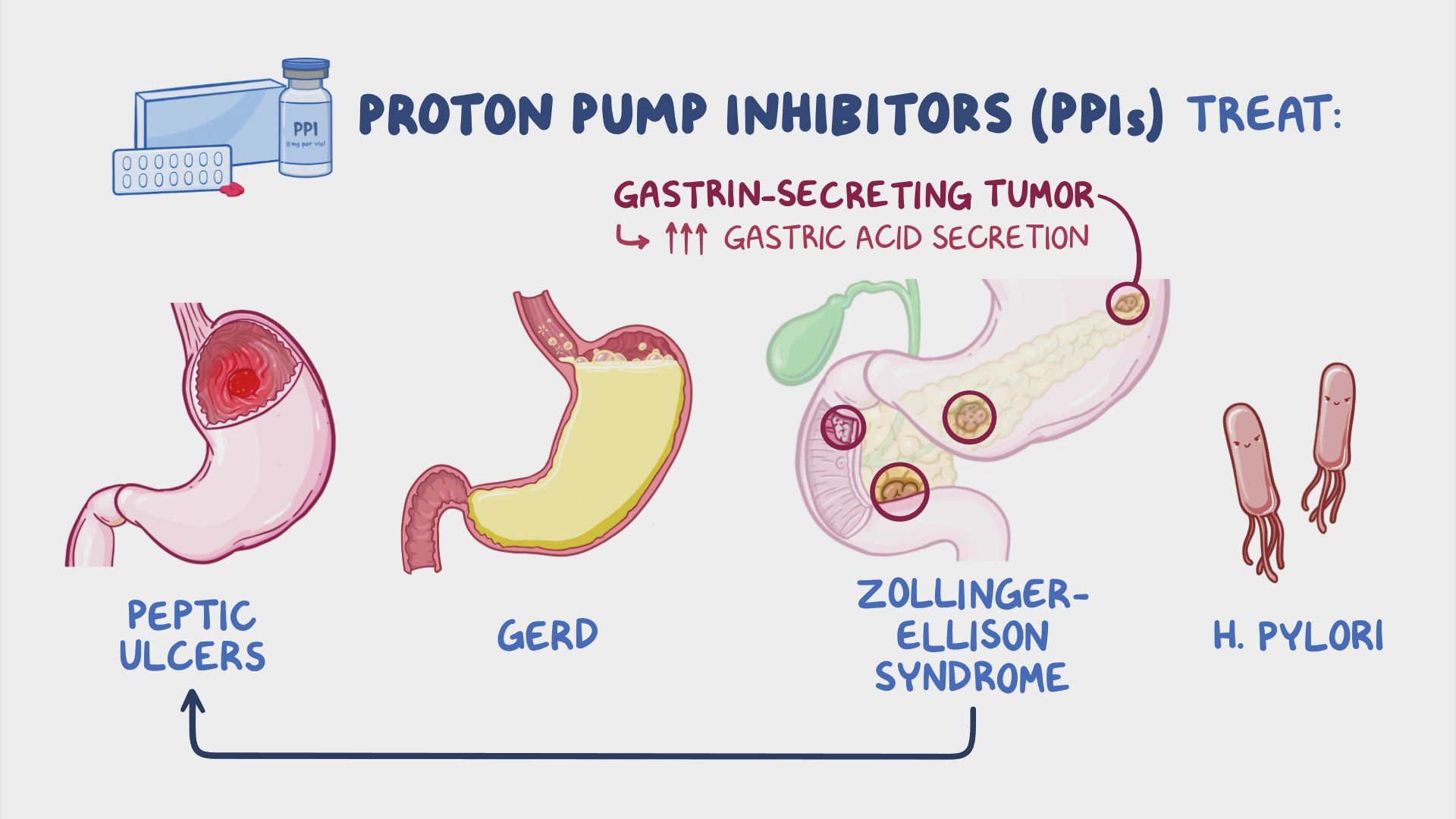
Proton pump inhibitors (PPIs) are a class of medications commonly prescribed to reduce stomach acid production. They are widely used to treat various gastrointestinal conditions, including acid reflux, gastroesophageal reflux disease (GERD), and peptic ulcers. PPIs work by inhibiting the proton pumps in the stomach lining, thereby decreasing the production of acid.
Despite their widespread use, there are several important facts about PPIs that individuals should be aware of. Understanding these facts can help patients make informed decisions about their healthcare and medication choices. In this article, we will explore 12 essential facts about proton pump inhibitors, shedding light on their uses, potential side effects, and important considerations for those taking these medications. Whether you are currently using PPIs or are simply interested in learning more about them, this comprehensive guide will provide valuable insights into these widely prescribed medications.
Key Takeaways:
- Proton Pump Inhibitors (PPIs) are effective in managing acid-related conditions like heartburn and ulcers, but long-term use may lead to potential risks such as fractures and rebound symptoms.
- PPIs should be taken on an empty stomach, and their use is often part of a comprehensive treatment approach that includes lifestyle modifications and dietary changes for optimal management of acid-related disorders.
Proton Pump Inhibitors (PPIs) are commonly prescribed medications used to reduce the production of stomach acid.
Proton Pump Inhibitors (PPIs) are a class of medications that are widely used to decrease the production of stomach acid. They are commonly prescribed to treat conditions such as gastroesophageal reflux disease (GERD), peptic ulcers, and inflammation of the esophagus. PPIs work by inhibiting the proton pumps in the stomach lining, which are responsible for producing acid. By doing so, they help alleviate symptoms such as heartburn, acid reflux, and indigestion.
PPIs are available both by prescription and over-the-counter.
These medications are available in both prescription and over-the-counter forms, making them easily accessible for individuals suffering from acid-related conditions. While prescription PPIs are typically used for more severe cases and require medical supervision, over-the-counter options provide relief for milder symptoms without the need for a doctor's prescription.
PPIs are often recommended for short-term use.
Healthcare providers generally advise using PPIs for a limited duration to manage acute symptoms. Long-term use of PPIs has been associated with potential risks, including an increased susceptibility to certain infections, decreased nutrient absorption, and bone density loss. Therefore, it is essential for individuals to follow their healthcare provider's guidance regarding the duration of PPI use.
PPIs should be taken on an empty stomach.
To maximize their effectiveness, PPIs are typically taken on an empty stomach, around 30 minutes to one hour before a meal. This timing allows the medication to be absorbed optimally and inhibit the proton pumps before the stomach begins producing acid in response to food intake.
PPIs may interact with other medications.
It is crucial to inform healthcare providers about all medications and supplements being taken, as PPIs can interact with certain drugs, potentially affecting their absorption and efficacy. This is particularly important for individuals with complex medication regimens or those managing chronic health conditions.
PPIs have been associated with potential side effects.
While generally well-tolerated, PPIs may lead to side effects such as headache, nausea, diarrhea, and abdominal pain. It is essential for individuals to be aware of these potential adverse effects and consult their healthcare provider if they experience persistent or concerning symptoms.
PPIs have been linked to an increased risk of fractures.
Long-term use of PPIs has been associated with a higher risk of fractures, particularly in the hip, wrist, and spine. This risk is believed to be related to the potential impact of PPIs on bone density and calcium absorption. Healthcare providers may consider bone density monitoring for individuals on prolonged PPI therapy, especially those with additional risk factors for osteoporosis.
PPIs play a crucial role in managing acid-related disorders.
For individuals with conditions such as GERD, esophagitis, and peptic ulcers, PPIs play a vital role in alleviating symptoms and promoting healing. They help reduce the acidity in the stomach, thereby minimizing the potential for further damage to the esophagus and stomach lining.
PPIs may require gradual discontinuation.
Abruptly stopping PPIs after long-term use can lead to a rebound effect, where the stomach produces excess acid in response to the sudden withdrawal of the medication. Healthcare providers may recommend a gradual tapering of PPIs to minimize the likelihood of rebound symptoms.
PPIs are not intended for immediate relief of heartburn.
While PPIs are effective in managing acid-related conditions, they are not designed for immediate relief of heartburn or acid reflux. Antacids or H2 blockers are more suitable for addressing acute symptoms, providing rapid neutralization of stomach acid.
PPIs are part of a comprehensive treatment approach.
In many cases, the use of PPIs is complemented by lifestyle modifications, dietary changes, and other medications to achieve optimal management of acid-related disorders. This comprehensive approach addresses the underlying factors contributing to the condition and aims to improve overall digestive health.
PPIs have revolutionized the treatment of acid-related conditions.
The introduction of PPIs has significantly transformed the management of acid-related disorders, offering effective and well-tolerated options for individuals experiencing discomfort due to excessive stomach acid. Their widespread availability and proven efficacy have made them a cornerstone of treatment for various gastrointestinal conditions.
Proton Pump Inhibitors (PPIs) have revolutionized the treatment of acid-related conditions, providing effective relief for individuals experiencing discomfort due to excessive stomach acid. These medications, available both by prescription and over-the-counter, play a crucial role in managing conditions such as gastroesophageal reflux disease (GERD), peptic ulcers, and esophagitis. While they are generally recommended for short-term use, it is important to be mindful of potential interactions with other medications and the possibility of side effects. PPIs are best taken on an empty stomach, and their use is often part of a comprehensive treatment approach that includes lifestyle modifications and dietary changes. Despite their effectiveness, long-term use of PPIs may be associated with certain risks, such as an increased susceptibility to fractures and the need for gradual discontinuation to avoid rebound symptoms. Overall, PPIs have significantly improved the management of acid-related disorders and continue to be a valuable therapeutic option for individuals seeking relief from symptoms associated with excessive stomach acid.
Conclusion
In conclusion, Proton Pump Inhibitors (PPIs) are widely used medications that effectively reduce stomach acid production, providing relief for various gastrointestinal conditions. However, it's crucial to be mindful of potential side effects and long-term usage implications. Patients should engage in open discussions with their healthcare providers to weigh the benefits and risks of PPI therapy. By staying informed and proactive, individuals can make well-informed decisions about their treatment plans and overall well-being.
FAQs
Q: Are PPIs safe for long-term use?
A: While PPIs are generally safe for short-term use, prolonged usage may pose certain risks, such as increased susceptibility to infections and nutrient deficiencies. It's important to consult a healthcare professional to assess the necessity of long-term PPI therapy and explore alternative treatment options if applicable.
Q: Can PPIs interact with other medications?
A: Yes, PPIs have the potential to interact with various medications, affecting their absorption and efficacy. Patients should inform their healthcare providers about all medications, including over-the-counter supplements, to prevent potential drug interactions and ensure safe and effective treatment.
Was this page helpful?
Our commitment to delivering trustworthy and engaging content is at the heart of what we do. Each fact on our site is contributed by real users like you, bringing a wealth of diverse insights and information. To ensure the highest standards of accuracy and reliability, our dedicated editors meticulously review each submission. This process guarantees that the facts we share are not only fascinating but also credible. Trust in our commitment to quality and authenticity as you explore and learn with us.


